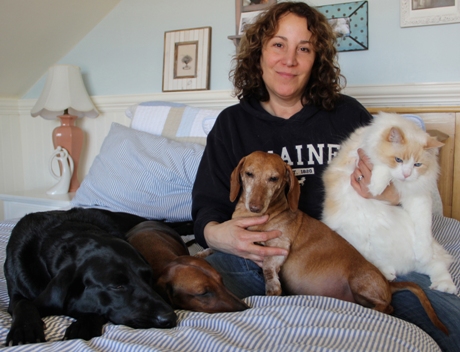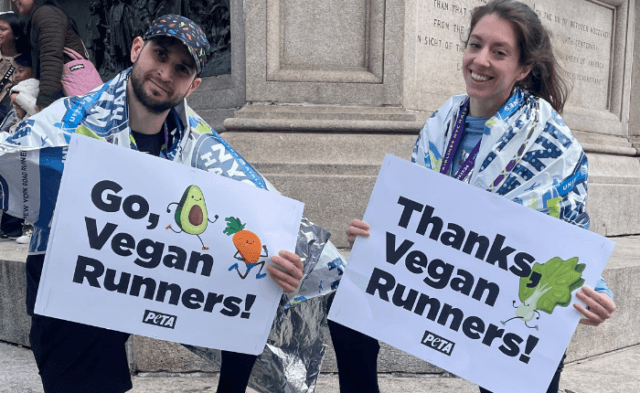
Please tell us a little about Hobbes and how he became a member of your family.
At the time (November 2009), we had just relocated to Vermont. We were getting married and both starting new jobs. It was an absolutely crazy time, and getting a new companion animal was not something we could even fathom then. One morning, I received a call from the Addison County Humane Society that they had just rescued a dachshund in bad shape and weren’t sure they could help him. They contacted me because my family had experience with dachshunds and if anyone could help him, I might be able to.
When I arrived at the shelter and saw how bad he looked, it rocked me to my core. I had no intention of getting a companion animal, but when I saw the welts, bloody bruises, and fear in his eyes, I knew I needed to act. I took pictures of this battered pup and sent them to Tami and also called her to get her take. When she saw the photos, she had the same reaction I did. Although we weren’t planning on this, the situation changed. This tiny dog needed our help. Other humans had failed him, but we weren’t going to. We adopted him the next day and changed his name to “Hobbes.” As soon as we got him home, I picked him up, cuddled him, and promised no one would EVER hurt him again. Our eyes met, and from that point on, I had a new best friend.
Hobbes co-hosts a radio show and podcast with you. What kind of topics do you talk about, and what’s it like having a canine co-host?
I had to be persuaded to have Hobbes on the radio with me. I was against it initially because I did not want it to look like he was being exploited. He is a family member, not an advertising gimmick. But as people heard about his story and what he had endured, the public wanted more. People wanted to hear about Hobbes because he is a survivor, and now, he has a medium (the radio) where his story can be told. The fact that he had been in a domestic violence situation and abused by a man and his children hit home and was very upsetting to people. They called on me to be his voice.
“Bruce & Hobbes Radio” is the only radio show in the nation with a canine as a full-fledged co-host. It airs weekly at www.BruceAndHobbes.com, and on the program, we talk about everything related to animals, including health issues, food, medical issues, training, and a lot more. We also have a Facebook page, “Bruce & Hobbes—Home of Your Two ‘Best Buddies!’,” which we hope everyone will “like.” And, Bruce and Hobbes recently conducted a two-part interview with PETA president Ingrid Newkirk, episodes 11 and 12.
As for the show itself, when we came up with the concept, we wanted to have an open dialog on animal issues and become THE source for information on these topics. We have experts to give people useful information and help improve the lives of their companion animals and also help humans become the BEST pet parents possible.
As far as what it’s like to have a canine co-host: I recognized pretty early on that he’s the star and that I get to do all the work. When our book on bullying, Hobbes Goes Home, came out and the governor of Vermont (Peter Shumlin) and our congressperson (Peter Welch) sent congratulatory letters addressed to Hobbes, I pretty much knew what my role was and is.
How have children reacted to Hobbes and his story at the schools you’ve visited?
Tami and I were not prepared for the reaction to his story. When we wrote Hobbes Goes Home, we thought the book would be of interest to school students, but it’s far exceeded anything we anticipated. We’re reading this book in EVERY Vermont school. We’ve gone to about 68 schools so far, and as Hobbes’ story is heard by more people, the interest grows and we receive more invitations to read our book, tell Hobbes’ story, and do our anti-bullying presentation. We’re finding students are mesmerized by the book, and then when they meet Hobbes and see he’s the face of abuse and domestic violence, it hits home. Kids are smart, and if you take time to explain things, they get it. Our purpose is to empower students. They CAN change the world, and it’s pretty obvious that they understand that.
How can we talk to our children and grandchildren about issues such as domestic violence, bullying, and cruelty to animals?
I think the fact that we’re “talking” about these issues is part of the solution. It seems that sometimes we’ve evolved into a society where it’s more convenient to ignore issues like these. The fact is that talking about domestic violence, bullying, and cruelty to animals isn’t fun or easy—but they are happening, and ignoring problems doesn’t help. It does quite the contrary and can make them worse. From a parental standpoint, if your kids bring these topics up, you need to find a way to explain that these types of behavior are not OK and why. It’s a case of letting kids know they are capable of making the world a better place and have a responsibility to do so. These topics also raise issues of peer pressure, “being cool,” and “fitting in”—tough issues for kids. The way we’ve addressed them, though, is that after sharing Hobbes story with students, we ask them how many of them think Hobbes thinks his mom and dad are cool because we saved his life. Every hand in the room goes up. Mission accomplished.
We’ve also found that the media can play an enormous role—for better or worse—in educating children about domestic violence, bullying, and cruelty to animals. When students see things on TV, parents might need to explain what is and what is not acceptable behavior. When the NFL was forced to confront the Ray Rice and Adrian Peterson incidents, it brought domestic violence to mainstream America. The league not only did a terrible job of handling the issue, it basically tried to make it go away and ignore it. What type of message is this sending to kids? A terrible one. Parents need to make sure kids understand this behavior is not acceptable. Yet both these players will probably play again and make millions. Is that right?
If any good did come out of these awful situations, awareness was raised that domestic violence IS serious and does happen and that there need to be consequences—even if the perpetrator is a star athlete. When the Rice and Peterson situations hit the media, we could barely keep up with requests to come speak, because compassionate people care about these issues and want them to be taken seriously.
How are bullying and cruelty to animals connected?
Our experience is that these two issues are connected because of “power” or a lack of it. In many cases, bullies pick on people smaller or weaker than themselves, simply because they can. Bullies may feel powerless to change some situations in their own lives and therefore take out their frustration on someone else. Cruelty to animals can work in the same way. A person may feel powerless or unable to change something in their own lives and so seek that power by abusing animals who cannot defend themselves. We saw this first-hand with Hobbes, because this seems to be what happened. What we find particularly concerning, however, is that children were involved in the abuse, and as multiple studies have shown, abuse is a cycle and if it’s not broken, these children will more than likely grow up to do the same thing.
What are some of the ways in which we can help the young people in our lives develop empathy and compassion for animals, and why is this important?
I think a big part of helping kids develop empathy and compassion for animals is having honest conversations with them about values and, as a parent, leading by example. Sometimes, those conversations aren’t all that comfortable. When Bruce speaks to students, he’ll talk to them about making the world a better place and how “it’s not all about ‘me’—it’s about ‘us.'” He’ll ask what they want to be remembered for and “Will it matter to the world that you even existed?” It’s a profound question that many students haven’t thought about before. Another major area is education—talking to students about making compassionate choices and “treating people like they would like to be treated,” regardless of whether we’re talking about a person or an animal. Animals are sentient beings, and they need to be treated as such. Many times, we’ll use role models in our presentations—like Abraham Lincoln or Mother Teresa—to show how people can accomplish great things and change history when they work on behalf of others. Empowering students to change the world (by acting with empathy and compassion for animals) is important, because although a great deal of progress has been made to make the world better for animals, there is still much more work to do. These students are tomorrow’s leaders, and an education solidified with empathy and compassion will make the world a better place for everyone.
Why is being a member of PETA’s Augustus Club important to you?
It’s been our experience that there are folks who talk about change and folks who actually make change happen—through their work or financial support. Our lives have been blessed with animals who have enriched us and given us purpose—animals like Hobbes who, without PETA, might not have anyone to defend them or protect their rights. We want to be remembered as people who loved animals and passionately worked to defend them and their rights. Being a member of PETA’s Augustus Club allows us to know that PETA can continue its lifesaving work with a little help from us, even when we’re doing our radio show from the sky.
What compelled you to dedicate your lives to advocating for animals? Was there an experience or an “ah-ha” moment?
Although we’ve always tried to help animals, rescuing Hobbes was our “ah-ha” moment. When we saw how badly he had been abused and the circumstances behind that abuse, it reinforced our commitment to making the world a better place for him and other animals like him. We were angry and disheartened. We had both seen animal abuse before but nothing like what we experienced when we first saw him and learned his story. At that moment, we made the decision to dedicate our lives to prevent situations like this from ever happening again, and if they did, to make sure that there would be consequences for the abusers.





